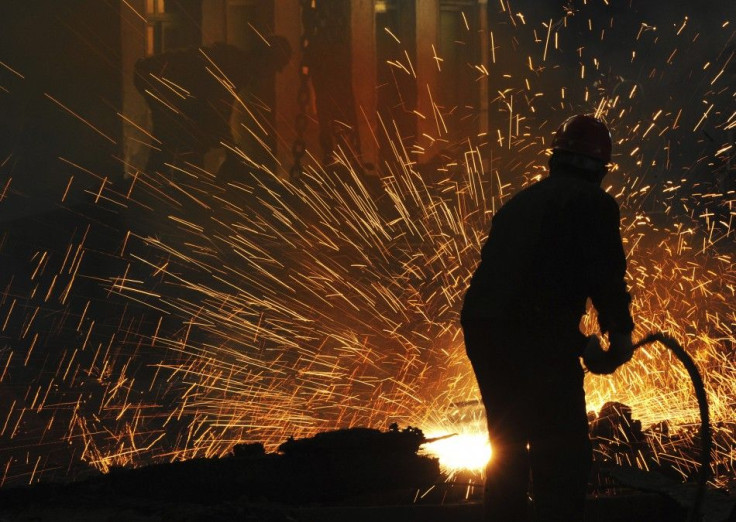Global Manufacturing: China, Europe Extend Slump In Sept; US Expands For 1st Time Since May

Factory output in the U.S. grew slightly in September for the first time in four months, but manufacturing in Europe and China last month once again wilted.
Factories in the euro zone suffered their worst quarter since early 2009, flagging a return to recession for the single currency bloc, while factory activity in China contracted for a seventh consecutive quarter.
The rise in the U.S. ISM manufacturing index in September, to a four-month high of 51.5 from 49.6 in August, will boost hopes that some of the recent slowdown in economic growth was just a summer phenomenon. Monday’s result topped expectations for a reading of 49.7, according to a Reuters poll.
Manufacturing has been a bright spot in a generally disappointing recovery since the recession ended in June 2009, but it had slowed this spring as consumers cut back on spending and businesses invested less in machinery and equipment.
September was the first time since May that the index has been above the 50 threshold that indicates expansion in the sector.
Moreover, the new orders index, which is the most forward-looking aspect of this survey, jumped to 52.3 from 47.1. And the employment index rose to 54.7, from 51.6.
Producers themselves also noted that “new orders are appearing this month without advanced notice” and “September brings with it increasing requirements and business.”
Yet, Paul Dales, senior U.S. economist with Capital Economics, warns against getting too carried away.
“At 51.5, the headline index is still consistent with annualized GDP growth of no more than 1.5 percent to 2 percent. And even the employment index is consistent with flat manufacturing payrolls,” Dales wrote in a note to clients. “The upshot is that the weak global economy and growing concerns over the domestic fiscal cliff will prevent a major rebound in U.S. economic growth.”
Separately, euro zone manufacturing put in its worst performance in the three months to September since the depths of the Great Recession, as the region’s fiscal crisis eroded investor confidence and clouded global growth prospects.
Markit's Manufacturing Purchasing Managers' Index (PMI) rose to 46.1 in September from 45.1 in August and above the preliminary reading of 46. But that was its 14th month of contraction.
Earlier figures from Germany showed manufacturing in Europe’s largest economy shrank for a seventh straight month in September. In France, the situation worsened dramatically with its PMI seeing one of the biggest one-month falls in the survey's 14-year history.
Italy and Spain, the third and fourth biggest economies in the crisis-hit region, both saw their PMIs remaining firmly in sub-50 territory.
Data released Monday by the European statistics agency, Eurostat, showed unemployment rate in the 17-country euro zone remained at its record high rate of 11.4 percent in August, another sign that the region is in danger of slipping into recession this year after its economic output dropped 0.2 percent in the second quarter. Six countries — Greece, Spain, Italy, Cyprus, Malta and Portugal — are already in recession.
Germany’s unemployment rate remained at 5.5 percent in August, while the jobless rate in Spain rose to 25.1 percent, the highest in the euro area.
“The rise in euro-zone unemployment in August, coupled with the still low level of the manufacturing PMI, adds to the evidence that the region is in a deepening and broadening recession,” Jennifer McKeown, senior European economist at Capital Economics, wrote in a note to clients.
Weakness in Europe is hitting economies across the globe.
While China’s two manufacturing PMIs both picked up in September, they give no strong reason to believe that the world’s second-largest economy is on the cusp of a sustained rebound.
China's official PMI rose to 49.8 in September from 49.2 in August, the National Bureau of Statistics said Monday, but remained in contractionary territory for a second successive month despite improving from August's low.
A private sector PMI survey published on Saturday by HSBC ticked up to 47.9 in September from a nine-month low of 47.6 in August,
Both reports suggest that last month brought more of the same for China’s manufacturing sector: stable, but historically-weak conditions and no clear sign of any improvement on the horizon.
China's annual economic growth could ease to 7.4 percent in the third quarter -- the seventh consecutive quarter of slowdown, before picking up to 7.6 percent in the final three months, according to the latest Reuters poll.
“Looking ahead, we expect the crisis in the euro zone to continue to weigh on the global economy in 2013,” Daniel Martin, Asia economist with Capital Economics, wrote in a note to clients.
© Copyright IBTimes 2024. All rights reserved.






















